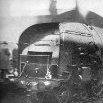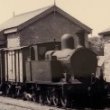-
Posts
7,579 -
Joined
-
Last visited
-
Days Won
47
Broithe last won the day on July 31 2025
Broithe had the most liked content!
Personal Information
-
Location
Rathdowney & Stafford.
Recent Profile Visitors
14,103 profile views
Broithe's Achievements
-
We had an obnoxious teacher who had a white Mini, with that white paint that quickly established a matt finish. One of the lads was convinced that it would be possible to lift it, with enough of us around it, and move it from 'his personal spot' in the school car park. This proved to be true, and we shifted it quite a way to the other side of the car park. Then, someone suggested that some water-based poster paint would be a good way to even further disguise it - so, it was quickly painted a nice red colour. At the time, I had a job after school, setting out stuff for the science classes for the next day. This meant that I was leaving and walking across the car park, just as he was discussing his stolen car with the two coppers that had turned up. He was standing with his back to the car, as he was looking at the vacant space where it had been, but the copper taking notes was facing in the opposite direction. He had just written down the registration number when he looked up and said, as I was 'innocently' walking past, "Would that be your car over there, Sir?" Between holding my breath and clenching my teeth, it's a wonder I didn't do lasting damage as I tried to vacate the scene without giving myself away...
-
Years ago, I had a pickup with a fibreglass top over the rear bed - very handy, but it made reversing on a turn very awkward. It was necessary to reverse into my drive, so I could emerge into the main road with much better visibility when driving back out. At the time, a girl two doors away had a boyfriend with a red Cortina, he always parked in the same place in the road and, if I pulled up right behind him, then a full left-lock would get me reliably into the entrance of my drive. This was very handy and I came to rely on it over the months that the romance lasted. Until one night when I pulled up, reversed in and got out of the driver's door - only to find myself ensnared in a very vicious rose bush that I haven't got. Extricating myself from the rose bush, I could see that I was actually in the front garden of a house about a hundred yards from mine. The car that I had pulled up behind was at least red, but it was an Alfa Romeo. I paid a bit more attention to fully establishing landmarks for a while after that...
-
I used to park my Honda in the same place on a Saturday, on my weekly venture into town, back in the 70s, when we still did stuff like that. There was a handy gap in the wall that created a useful short-cut from 'my spot'. The 400/4 was not a hugely secure vehicle and I arrived back there one day to find that it was absent. I was annoyed, but not greatly surprised, there had been at least two attempts at stealing it before. At that time, the town's cop shop was only about 200 yards away and was still open most of the time, so I went off to report the event. There were a few people in front of me at the desk - this turned out to be useful, as it meant that, by the time I was standing in front of the sergeant at the counter, I was able to say "Ah, I remember where it is now!", and leave him to deal with other more serious matters. I had arrived to find that there was no space for me that morning and had parked it about a quarter of a mile away, on the site of the demolished fire station... At the factory where I worked, we had a manager who was a constant source of amusement - every few days, he would perform some bizarre, but interesting, 'theatre'. One day, it was lashing down when lunch hour arrived, so he drove to the canteen in his company car. At the end of the day, when he went to go home, the car was nowhere to be seen - so, he called the police, who eventually arrived and questioned him about the event. "When did you last see your car, Sir?" "I drove to the canteen at lunch time." "Mmm, and did you drive it back here, Sir?" At this point, Malcolm realised that it had stopped raining as he ate his dinner and he had walked back to the office in the nice, warm sunshine...
-
And the process in between...
-
Enniscorthy. During the flood event - and after a good clean-up.
-
The cops'll pull you for that. And the insecure, unstrapped load. And, I'll bet there's no working tacho...
-
Because you're worth it.
-
I lived in digs in the mid-70s. The landlord had a yellow Mk1 Escort - his pride and joy. The landlady really only went in it at the weekend, always shopping on a Saturday morning. They habitually parked on some waste ground, the result of a famous fire in the 60s. One day, they came back and loaded up the car, setting off or home with the week's supplies. About a mile into the journey, she started to notice that the car was not as pristine as he usually kept it - sweet wrappers in the ashtray, fingerprints on the windows, etc. "You've let this car get into a bit of a state!" Suddenly, he could see what she had seen, and that the mileage was a lot higher suddenly. Realising what had happened they turned round and went back, the space the car had been in had been occupied again in their absence, so they parked as near to their own car as they could and emptied the boot as quickly as possible, keeping an eye out for the real owner. He appeared just after that had cleared the scene, looking mystified that his car was not where he thought he'd parked it and, looking round, he saw it off in the distance. He got in and started it, driving off past them. as they were still loading up their real car. He probably never knew, but might have wondered why the car was already warm...
-
My other forum used to be in the same position, showing the five or ten real users online, plus a few hundred guests, mostly harvesting robots. For some reason unknown to me, this stopped a couple of months ago and it now just shows real users plus some automated spam accounts that have never fully completed the 'entry process' and so can't post.
-
Or just a threshing machine?
-
CIE 1950s light green - preferred commercial paint shade?
Broithe replied to Mol_PMB's question in Questions & Answers
It is being watched - from inside and outside... -
CIE 1950s light green - preferred commercial paint shade?
Broithe replied to Mol_PMB's question in Questions & Answers
Indeed, there are all sorts of odd individual perception issues - I even see slightly different colours in each eye, most noticeable with pale creams, etc - probably due to the start of a cataract. Trust nobody - not even yourself. An odd one that I accidentally found, when trying to fix a disaster at work once, is that your vision doesn't all operate in the same time-frame. The centre is processed faster, as it is more likely to be important, I suppose. I needed to illuminate an object down a small, long hole - this meant having the torch right next to my eye - when I turned it on, the object lit up just before the torch did, apparently. The processing delay is short, only just perceptible, but it was very obvious when it happens 'in the wrong order' -
CIE 1950s light green - preferred commercial paint shade?
Broithe replied to Mol_PMB's question in Questions & Answers
There is a genuine issue about females whose fathers have Daltonism - red/green colour blindness - they often have enhanced perception of reds and browns. -
Actually, I think it's a bit too fast now. Could it be slowed? Just a little bit...
-
We are all migrants. That could upset a few. All very rapid here.
.png.c363cdf5c3fb7955cd92a55eb6dbbae0.png)








